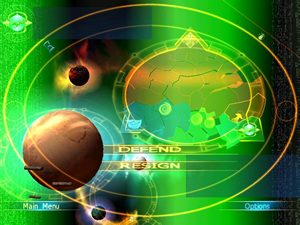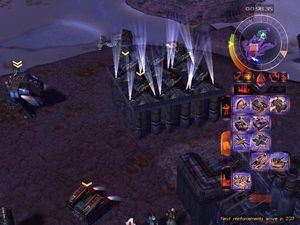Putting the spice back into the strategy.
Ever wonder why you have to chop trees and mine gold in Warcraft?
How exactly does that make an orc? Why are all those crystals just lying around
in Starcraft? And what the heck is vespine gas? Any
idea? The biggest mystery might be the Command
& Conquer series. You’re in the army, right? So shouldn’t they just give you
some troops and tanks and stuff? Why the heck do you have to go around mining
all the time? That’s probably why Vietnam got all messed up.
It’s the same in just about every real-time strategy game on the market: you
send out your peons, collectors, peasants, harvesters, grunts, drones, villagers
or SCVs to gather food, wood, ore, metal, energy, gold, mana, gems, gas, crystals,
tiberium, asteroids, stone, or even "tone.”
I’m here to tell you why.
It all began back in 1992 with the very first RTS game, a revolutionary offering
from Westwood called Dune II. This amazing game took over my life for
a while, replacing a far less interesting game I was playing called “school,”
and its sequel, “detention.” Those of you familiar with the Dune universe,
through either the books by Frank Herbert or the movie directed by David Lynch,
have already figured out where I am going. It all began with the original resource:
Spice.
Spice is a powerful, mind-altering substance. Distilled and ingested in different
ways, it can enhance the mind and change the body. It can prolong human life.
Mentats use it to become human supercomputers. The Bene Gesserit use it to build
their formidable psychic powers. But most importantly, Guild navigators, mutated
beyond recognition through years of consumption and training, have the ability
to ‘fold’ space, making interstellar travel possible. Without the Spice Melange,
the universe grinds to a halt, and it is only found in one place, a desert planet,
Arrakis, Dune.
Three great houses war for control of the planet. House Atreides is military in structure, but generally benevolent and fair, House Ordos is known for their technology and trading skills, and House Harkonnen is infamous for their brutal strength.
Westwood’s Emperor: Battle for Dune lets you play as any of these three
houses and try to take advantage of their unique soldiers, weapons and strengths.
This is the latest in the series that started it all, and in a sense, not much
has changed. Build your base, harvest Spice, build units, defeat the enemy and
watch out for those big nasty sandworms.
The gameplay is so similar to other RTS games that experienced gamers will
have no problem leaping straight into the fray. Build a barracks to create troop
units, which are mostly useless in Emperor because the tanks can run
them right over. They are, however, cheap (there’s a moral message here somewhere).
Build a factory to create the 4 or 5 ground vehicles available to each side.
A hangar completes the set with a couple airborne options. All in all, while
there is good differentiation in the units, there aren’t that many of them per
house. It feels a little light.
The units themselves are smarter than the moronic little Starcraft guys,
but dumber than the robots in Total Annihilation. They
can move and fire at the same time (if they have mobile weaponry) and repair
vehicles will repair units on their own without micromanagement. But they also
have a frustrating tendency to stand there like idiots getting hit by an enemy
that’s just out of their range. Putting them on patrol along pathways you can
create seems to up their IQ considerably.
 What is
What is
new is that Emperor has more single-player game than any other RTS game
to date. Much more. Each house has different plots, movies to flesh them out,
and even branching plots within! Furthermore, as the game progresses, you may
(or may not) find opportunities to ally with five other factions, like the Fremen
natives or the Imperial Sardaukar and make use of their unique fighters.
Finally, rather than going from mission 1 to mission 2 and so on (yawn), Emperor
gives you a tactical map of the planet between each battle. With some knowledge
of the conditions in each area, you choose who to attack and when. Like the
game of Risk, the more territories you have surrounding the combat zone
in question, the more you can support your attack with additional resources
and troops. Lose a battle and it’s not the end of the game. You can try to take
that particular territory again later. Be prepared to defend your hard-won territory
as well, because the computer gets a turn. You may fight repeatedly for the
same piece of real estate, and each time it retains (what’s left of) your base,
the scars of battle, and the results of over-harvesting of spice. Very, very
cool.
The graphics are also impressive, with fully 3D terrain, buildings and units.
They are, however, a little punishing to those without the latest and greatest
computers. My computer is pretty damn good, with a 64mb Voodoo 5500, and I still
had to turn some of the graphical options down. GeForce 3, where art thou?!
The sound matches the big budget production. Guns, bombs and voices with much of the music taken from the movie. No real flaws, but nothing inspirational either.
Multiplayer is exactly what you’d expect from the veteran makers of C&C
– a solid experience provided by Westwood Online. Or if you are an aficionado
of the LAN party, Emperor comes on 3 CD’s (one for each house), making
LAN games a snap without having to buy additional copies.
But what really shines in Emperor is what shone in Dune II before
it. The universe feels fully fleshed out and not just slapped together for a
game. You understand the houses, the units, the motivations, and the raison
d’ etre. And of course, harvesting finally feels right.

-
Dynamic global map and missions!
-
Tons of plot
-
Great universe
-
Slick graphics
-
Typical gameplay
-
Underwhelming AI











